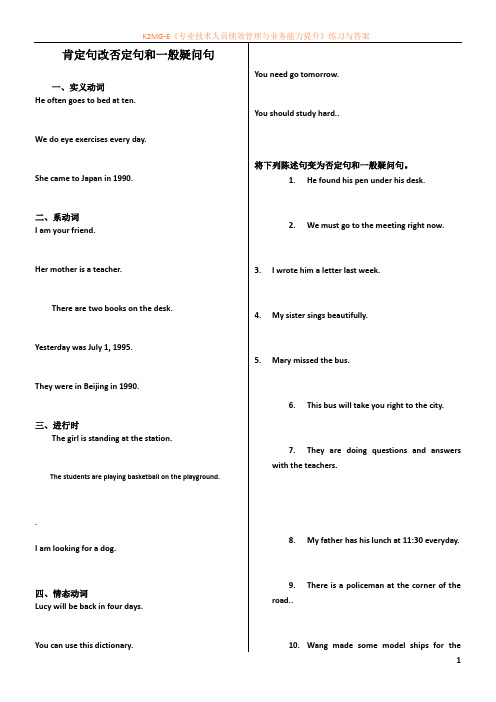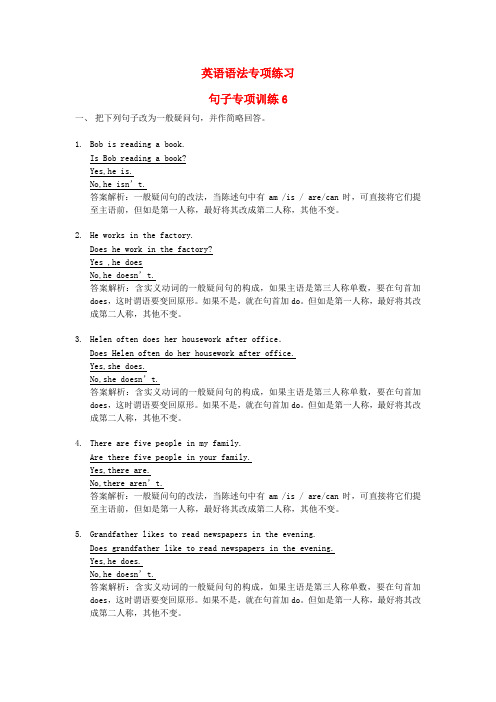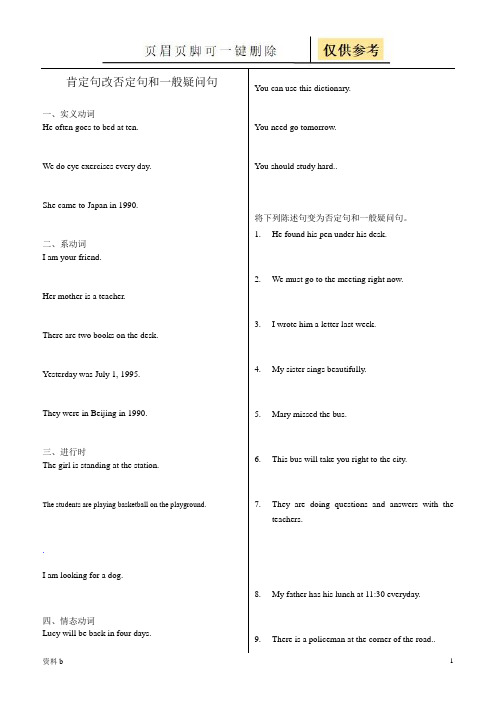小学英语专项复习-肯定句变一般疑问句
小学英语肯定句变否定句和一般疑问句类型(含答案)

The girl is standing at the station.
→The girl is not standing at the station.
→Is the girl standing at the station?
The students are playing basketball on the playground.
31.He found his pen under his desk.
He didn’t find his pen under his desk.
Did he find his pen under his desk?
32.We must go to the meeting right now.
We must not go to the meeting right now.
She came toJapanin 1990.
→She did not come to Japan in 1990.
→Did she come to Japan in 1990?
二、系动词
I am your friend.
→I am not your friend.
→Are you my friend?
Yesterday was July 1, 1995.
→Yesterday was not July 1, 1995.
→Was yesterday July 1, 1995?
They were inBeijingin 1990.
→They were not in Beijing in 1990
→Were they in Beijing in 1990?
14.They are playing on the playground.
英语语法肯定句变一般疑问句及回答

英语语法专项练习句子专项训练6一、把下列句子改为一般疑问句,并作简略回答。
1.Bob is reading a book.Is Bob reading a book?Yes,he is.No,he isn’t.答案解析:一般疑问句的改法,当陈述句中有am /is / are/can时,可直接将它们提至主语前,但如是第一人称,最好将其改成第二人称,其他不变。
2.He works in the factory.Does he work in the factory?Yes ,he doesNo,he doesn’t.答案解析:含实义动词的一般疑问句的构成,如果主语是第三人称单数,要在句首加does,这时谓语要变回原形。
如果不是,就在句首加do。
但如是第一人称,最好将其改成第二人称,其他不变。
3.Helen often does her housework after office.Does Helen often do her housework after office.Yes,she does.No,she doesn’t.答案解析:含实义动词的一般疑问句的构成,如果主语是第三人称单数,要在句首加does,这时谓语要变回原形。
如果不是,就在句首加do。
但如是第一人称,最好将其改成第二人称,其他不变。
4.There are five people in my family.Are there five people in your family.Yes,there are.No,there aren’t.答案解析:一般疑问句的改法,当陈述句中有am /is / are/can时,可直接将它们提至主语前,但如是第一人称,最好将其改成第二人称,其他不变。
5.Grandfather likes to read newspapers in the evening.Does grandfather like to read newspapers in the evening.Yes,he does.No,he doesn’t.答案解析:含实义动词的一般疑问句的构成,如果主语是第三人称单数,要在句首加does,这时谓语要变回原形。
小学英语肯定句变否定句和一般疑问句类型(含答案)(训练习题)

肯定句改否定句和一般疑问句一、实义动词He often goes to bed at ten.We do eye exercises every day.She came to Japan in 1990.二、系动词I am your friend.Her mother is a teacher.There are two books on the desk.Yesterday was July 1, 1995.They were in Beijing in 1990.三、进行时The girl is standing at the station.The students are playing basketball on the playground..I am looking for a dog.四、情态动词Lucy will be back in four days. You can use this dictionary.You need go tomorrow.You should study hard..将下列陈述句变为否定句和一般疑问句。
1.He found his pen under his desk.2.We must go to the meeting right now.3.I wrote him a letter last week.4.My sister sings beautifully.5.Mary missed the bus.6.This bus will take you right to the city.7.They are doing questions and answers with theteachers.8.My father has his lunch at 11:30 everyday.9.There is a policeman at the corner of the road..10.Wang made some model ships for the boys.11.I saw somebody in the room just now.12.There is some wonderful news in today’s paper.13.Xiao Li dropped the letter into the letter box.14.They are playing on the playground.15.Tom often tells them stories in French.16.After class some students play balls.17.Mary is reading newspaper now.18.I telephoned you yesterday.19.You have to go now.20.I have a house in the country.21.We did our homework together.22.They study for examination. 23.We are talking about the film.24.I can go to the zoo today.25.The first class begins at eight o’clock.26.It takes you three hours to go to Paris by air.27.I reviewed my lessons yesterday.28.I’ll go home by bus.29.He forgot to post the letter this morning.30.This room is going to be painted next week.肯定句变否定句和一般疑问句类型答案一、实义动词He often goes to bed at ten.→He does not often go to bed at ten.→Does he often go to bed at ten?We do eye exercises every day.→We don’t do eye exercises every day.→Do you do eye exercises every day?She came to Japan in 1990.→She did not come to Japan in 1990.→Did she come to Japan in 1990?二、系动词I am your friend.→I am not your friend.→Are you my friend?Her mother is a teacher.→Her mother is not a teacher→Is her mother a teacher?There are two books on the desk.→There are not two books on the desk→Are there two books on the desk?Yesterday was July 1, 1995.→Yesterday was not July 1, 1995.→Was yesterday July 1, 1995?They were in Beijing in 1990.→They were not in Beijing in 1990→Were they in Beijing in 1990?三、进行时The girl is standing at the station.→The girl is not standing at the station.→Is the girl standing at the station?The students are playing basketball on the playground. →The students are not playing basketball on the playground.→Are the students playing basketball on the playground?I am looking for a dog.→I am not looking for a dog.→Are you looking for a dog?He was writing letters at this time last night.→He was not writing letters at this time last night.→Was he writing letters at this time last night?We were having a meeting this time yesterday.→We were not having a meeting this time yesterday.→Were you having a meeting this time yesterday?四、情态动词Lucy will be back in four days.→Lucy will not be back in four days.→Will Lucy be back in four days?You can use this dictionary.→You can not use this dictionary.→Can I use this dictionary?You need go tomorrow.→You need not go tomorrow.→Need I go tomorrow?You should study hard.→You should not study hard..→should I study hard?将下列陈述句变为否定句和一般疑问句。
小学英语改为一般疑问句练习题

小学英语改为一般疑问句练习题一:有be动词的,只需要把be动词移到句子的最前面。
注意需要互换的词I ?you, my ?your, we ?you二:有情态动词的,只需要把情态动词移到句子的最前面。
注意需要互换的词I ?you, my ?your, we ?you 三:没有be 动词和情态动词的,在句子最前面加一个Do, 原来的句子顺序不变。
注意需要互换的词I ?you, my ?your, we ?you1. I am a student. ------- ______ ______ a student?2. These are my robots. ---------________ ________ ________ robots?3. I can see your doll. -------- ________ ________ see ________ doll?4. Sam and Bobby drink my milk. ------ _______ Sam and Bobby drink ______ milk?5.We are friends. --------- _________ ________ friends?6. We can sing and dance. -------- _______ ______ sing and dance?7.This is your crayon. ---------________ _______ _______crayon?8. There is a book on the table. ------- _____________ a book on the table?9. He can clean the blackboard. ------- ______ _______ clean the blackboard?10. I’d like a pie. ------- ________ ________ likea pie?11. I have five toy monkeys. ------ ______ ______ have five toy monkeys?12. I eat my cake. -------_______ ______ eat _______ cake?四:综合练习,将下列句子改为一般疑问句。
小学英语句型转换之肯定句改否定句、一般疑问句

小学英语句型转换之肯定句改否定句、一般疑问句一、肯定句改否定句的方法1.直接在be动词(am, is, are, was, were)后加not。
如:is not ,are not ,am not。
如果有some 就改成any,其余照抄。
2.直接在can,should,will等后加not。
如:cannot,should not,will not;如果有some 就改成any,其余照抄。
3.上述都没有的,在动词前加助动词否定形式don’t,doesn’t,didn’t。
如:——I am a girl.——I am not a girl.——You are a student.——You are not a student./You aren’t a student.——This is Tom’s bag.——This is not Tom’s bag./This isn’t T om’s bag.二、肯定句改一般疑问句的方法1.把be动词( am, is, are, was, were))放在句首,如果句子里有some 就改成any,I改成you,my改成your,剩下的照抄,句号改成问号。
2.把can,shall,will,would,should ,could,may ,must等放到句首,如果句子里有some 就改成any,I就改成you,my就改成your,剩下的照抄,句号改成问号。
3.上述都没有的,就在句首加助动词Do,Does,Did帮忙,如果句子里有some 就改成any,I就改成you,my就改成your,剩下的照抄,句号改成问号。
4.注意:句首的第一个字母要大写,句尾标点应为“?”。
变一般疑问句时,肯定句是I am …,就把I am …变成Are you …?变一般疑问句时,肯定句I was …,就把I was …变成Were you …?如:——I am in Class 6.——Are you in Class 6?——You are from America.——Are you from America?——It is an orange.——Is it an orange?5.就一般疑问句回答一般疑问句有两种回答,即:肯定回答和否定回答。
小学英语改为一般疑问句练习题

小学英语改为一般疑问句练习题一:有be动词的,只需要把be动词移到句子的最前面。
注意需要互换的词I ?you, my ?your, we ?you二:有情态动词的,只需要把情态动词移到句子的最前面。
注意需要互换的词I ?you, my ?your, we ?you三:没有be 动词和情态动词的,在句子最前面加一个Do, 原来的句子顺序不变。
注意需要互换的词I ?you, my ?your, we ?you1. I am a student. ------- ______ ______ a student?2. These are my robots. ---------________________ ________ robots?3. I can see your doll. -------- ________ ________ see ________ doll?4. Sam a nd Bobby drink my milk. ------ _______ Sam and Bobby drink ______ milk?5.We are friends. --------- _________ ________friends?6. We c an sing and dance. -------- _______ ______ sing and dance?7.This is your crayon. ---------________ ______________crayon?8. There is a book on the table. ------- _____________ a book on the table?9. He can clean the blackboard. ------- _____________ clean the blackboard?10. I’d like a pie. ------- ________ ________ likea pie?11. I have five toy monkeys. ------ ______ ______ have five toy monkeys?12. I eat my cake. -------_______ ______ eat _______ cake?四:综合练习,将下列句子改为一般疑问句。
小学英语肯定句变否定句和一般疑问句类型(含答案)

肯定句改否定句和一般疑问句一、实义动词He often goes to bed at ten.We do eye exercises every day.She came to Japan in 1990.二、系动词I am your friend.Her mother is a teacher.There are two books on the desk.Yesterday was July 1, 1995.They were in Beijing in 1990.三、进行时The girl is standing at the station.The students are playing basketball on the playground..I am looking for a dog.四、情态动词Lucy will be back in four days.You can use this dictionary. You need go tomorrow.You should study hard..将下列陈述句变为否定句和一般疑问句。
1.He found his pen under his desk.2.We must go to the meeting right now.3.I wrote him a letter last week.4.My sister sings beautifully.5.Mary missed the bus.6.This bus will take you right to the city.7.They are doing questions and answers with theteachers.8.My father has his lunch at 11:30 everyday.9.There is a policeman at the corner of the road..10.Wang made some model ships for the boys.11.I saw somebody in the room just now.12.There is some wonderful news in today’s paper.13.Xiao Li dropped the letter into the letter box.14.They are playing on the playground.15.Tom often tells them stories in French.16.After class some students play balls.17.Mary is reading newspaper now.18.I telephoned you yesterday.19.You have to go now.20.I have a house in the country.21.We did our homework together.22.They study for examination.23.We are talking about the film.24.I can go to the zoo today. 25.The first class begins at eight o’clock.26.It takes you three hours to go to Paris by air.27.I reviewed my lessons yesterday.28.I’ll go home by bus.29.He forgot to post the letter this morning.30.This room is going to be painted next week.肯定句变否定句和一般疑问句类型答案一、实义动词He often goes to bed at ten.→He does not often go to bed at ten.→Does he often go to bed at ten?We do eye exercises every day.→We don’t do eye exercises every day.→Do you do eye exercises every day?She came to Japan in 1990.→She did not come to Japan in 1990.→Did she come to Japan in 1990?二、系动词I am your friend.→I am not your friend.→Are you my friend?Her mother is a teacher.→Her mother is not a teacher→Is her mother a teacher?There are two books on the desk.→There are not two books on the desk→Are there two books on the desk?Yesterday was July 1, 1995.→Yesterday was not July 1, 1995.→Was yesterday July 1, 1995?They were in Beijing in 1990.→They were not in Beijing in 1990→Were they in Beijing in 1990?三、进行时The girl is standing at the station.→The girl is not standing at the station.→Is the girl standing at the station?The students are playing basketball on the playground.→The students are not playing basketball on the playground.→Are the students playing basketball on the playground?I am looking for a dog.→I am not looking for a dog.→Are you looking for a dog?He was writing letters at this time last night.→He was not writing letters at this time last night.→Was he writing letters at this time last night? We were having a meeting this time yesterday.→We were not having a meeting this time yesterday.→Were you having a meeting this time yesterday?四、情态动词Lucy will be back in four days.→Lucy will not be back in four days.→Will Lucy be back in four days?You can use this dictionary.→You can not use this dictionary.→Can I use this dictionary?You need go tomorrow.→You need not go tomorrow.→Need I go tomorrow?You should study hard.→You should not study hard..→should I study hard?将下列陈述句变为否定句和一般疑问句。
最新小学英语语法肯定句变一般疑问句、特殊疑问句的用法归纳总结

最新小学英语语法肯定句变一般疑问句、特殊疑问句的用法归纳总结小学语法—疑问句一、疑问句的分类疑问句就是提出疑问的句子。
分为:一般疑问句、特殊疑问句、选择疑问句和反意疑问句四种。
小学阶段不涉及反意疑问句和选择疑问句。
二、一般疑问句以Be动词,情态动词,助动词开头的疑问句,叫一般疑问句。
回答一般用“yes/no”来回答。
读的时候语音音调要上扬。
一般疑问句的结构:构成一般疑问句回答1Be动词在前Is he your father?Yes,he is/No,he isn′t Was she at home yesterday?Yes,she was/No,she wasn′t Are you at home?Yes,I am/No,I am not2情态动词在前Can you play the piano?Yes,I can/No,I can′t Could you do your homework?Yes,I can/No,I can′t3助动词在前Do you do your homework?Yes,I do/No,I don′tDoes she do her homework?Yes,she does/No,she doesn′t Did you do your homework?Yes,I did/No,I didn′tWill you do your homework?Yes,I will/No,I won′tIs she doing her homework.Yes,she is/No,she isn′t注意:回答一般疑问句时,肯定回答用“yes”,否定回答用“no”。
紧跟着的是人称(一般是代词),最后是一般疑问句的第一个词,如果是“no”否定回答还要把它加上not。
eg:Did you do your homework?你做作业了吗?Yes,I did/No,I didn′t(√)是的,我做了/不,我没有Yes,I didn′t(×)No,I did(×)Yes,I do(×)No,I doesn′t(×)三、肯定句如何变一般疑问句肯定句变一般疑问句与改成否定句窍门差不多,也是去找谓语(主要动词),再变化,遇到some要变成any。
- 1、下载文档前请自行甄别文档内容的完整性,平台不提供额外的编辑、内容补充、找答案等附加服务。
- 2、"仅部分预览"的文档,不可在线预览部分如存在完整性等问题,可反馈申请退款(可完整预览的文档不适用该条件!)。
- 3、如文档侵犯您的权益,请联系客服反馈,我们会尽快为您处理(人工客服工作时间:9:00-18:30)。
小学英语专项复习肯定句变一般疑问句(无答案)
1. 含系动词be的一般疑问句的构成
具体地说,就是当陈述句中有am /is / are时,可直接将它们提至主语前,但如遇第一人称,最好将其置换成第二人称。
如:
I’m in Class 2, Grade 1. →Are you in Class 2, Grade 1 你是在一年级二班吗
2. 含情态动词的一般疑问句的构成
一般疑问句面前人人平等:情态动词与am / is / are一样,也可直接将它们提至主语前,所以问题迎刃而解了。
如:
I can spell it. →Can you spell it 你会拼写它吗
3. 含实义动词的一般疑问句的构成
含实义动词的一般疑问句的构成稍微有点讲究,要在句首加do;如逢主语为第三人称单数,谓语动词为一般现在时单数第三人称形式"v-(e)s"时,奉does为座上宾并要变回原形(如has→have,likes→like等);有时陈述句中的some还要变作any等。
如:
She lives in Beijing. →Does she live in Beijing 她住在北京吗
I like Engli sh. →Do you like English 你喜欢英语吗
5. 少数口语化的一般疑问句
如问一个与前文相同的问句时,可省略成"And you"或"What / How about..."等;甚至只抓关键词,读作升调。
如:Your pen 你的钢笔
练习:
将下列句子变成一般疑问句.
1. She is doing some cleaning.
_____ she doing ________ cleaning
2. They were watching TV at this time yesterday.
_____ they ________ TV at this time yesterday
3. She goes bicycling twice a week.
______ she _____ bicycling twice a week
4. She has to clean the classroom every day.
_____ she _____ to clean the classroom every day
5. She does morning exercises every day.
_____ she _____do morning exercises every day
6. We did morning exercises yesterday.
_____ you _____ morning exercises yesterday
7. Jim used to be a policeman.
______ Jim _____ be a policeman
8. I am from Canada.
_____ _____ from Canada
9. She is looking for her dog.
_____ she __________ for her dog
10. They are some knives.
______ they ______ knives
1。
